
Divorce American Style: "Debbie Reynolds isn't Tammy anymore, and neither am I!" Right You Are, Dick Van Dyke.
June 20, 2014
This piece was written as part of the 1967 in Film Blogathon, hosted by Silver Screenings and The Rosebud Cinema. For a very comprehensive look at the year in movie history, feel free to browse and enjoy a variety of great articles here.

Well guys, is it?
Scene: Weekday, presumably a little after 5pm. Cars pull into driveways. Husbands and fathers return home from a long day at work. A conductor makes his way to the top of a hill overlooking a pleasant suburban neighborhood and raises his arms as if to start a symphony.
Which one of these doesn't belong?
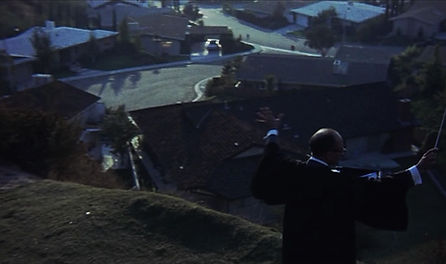
Something tells me this won't be a pretty song.
In Divorce American Style, all of them do. Said symphony is actually a cacophony of voices, unseen husbands and wives bickering over trivial domestic concerns, slowly joined by a rousing score. Barbara and Richard Harmon (Debbie Reynolds and Dick Van Dyke) rip on each other right up to the moment their front door opens and in walks a large group of their friends, arriving for a dinner party. The jerky, invasive camera captures the frantic facade of gaiety each and every one of the guests wear, including the hosts, and moments later, without sharing any part of the get together with the audience, the guests leave as quickly as they came but definitely worse for wear, looking disheveled, drained and most likely drunk.

What a crowd for a dinner party!
So adequately sets the stage for a how-to (or not) guide for divorce, 1967 American style, courtesy of Barbara and Richard Harmon and friends:
1. Argue over inconsequential issues.
* For wives, the lack of communication argument is a go-to. After all, communication "isn't just talking, it's feeling the other person. It's making contact...you wouldn't understand," Barbara says.
* For husbands, money is always a good topic to bring up, particularly if you've worked hard to finally achieve the so-called American Dream; what does your wife have to be unhappy about?
Also wonder what the children will think of your quarreling - but just briefly - then carry on the wrangling. (Just for the record, the kids can hear and have been keeping score for a while now).

For those counting, the score is Mother: 23, Dad: 26.
2. Resort to the silent treatment. It totally gets the point across, especially during normal routines like getting ready for bed.

Is that an earthquake? No, it's just Richard Harmon (Dick Van Dyke) practicing his calisthenics to the chagrin of wife Barbara (Debbie Reynolds)
3. Attempt to appease your partner: see a therapist.
* For husbands, the therapist will probably advise you that your job is to "keep her balloon inflated." If you're an unsophisticated couple, as Richard proclaims he and Barbara to be, the visit may be deemed a failure.
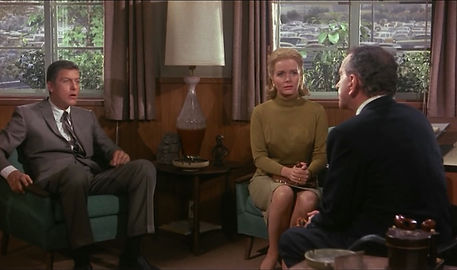
By the looks of it, this isn't Richard's cup of tea.
4. Seek comfort or advice from a friend.
* For husbands, a guy's night at the bar with a friend can be helpful for drowning your sorrows. In Richard's case, Lionel (Joe Flynn) offers a friendly ear...then suggests that a trip to the local prostitute, Dede (Lee Grant) should do the trick, as the "only way to live in a marriage is to live out of it too." Wise words that can double as grounds for divorce, Lionel.

Yes, the ring's still there, Richard. Even though Lionel (Joe Flynn) seems to be scouting out ladies for you.
5. Mental and physically falter.
* For husbands, if you did visit a prostitute's apartment, the physical incapability may be due to drunkenness. Even if services were not used, as a gentlemen you offer money for her time anyway, which backfires: "I didn't do anything for that - what kind of girl do you think I am?" (Do not answer that).

Dede (Lee Grant) isn't particularly amused that Lionel brought over an extremely drunk Richard.
6. Attempt a reconciliation, which seems to work at first and then...doesn't.
* For husbands, do not accidently mention aforementioned prostitute's name to your wife.
* For wives, you do have a right to be upset over the prostitute situation - after all, if your husband were to have a heart attack, his body would be found in another woman's home!

This was going well...

...until Richard slips up. I'm sure Barbara wishes that doughnut were Richard's neck.
7. This time feels as right as any to make this a full-fledged separation. Test the waters by living apart.
* For wives, though you just separated, you may find your friends actually help the usher divorce proceedings along by recommending you consult a lawyer, who in turn brings up the idea of divorce, though you may never have thought of that.
8. Clear out those shared bank accounts. Quick. Before the other party gets there. Don't cross paths doing this - that would be awkward.

Zombie Barbara, with friend Fern (Emmaline Henry) there for support, points fingers at the bank. Wonder who's on the receiving end?

Who, me? Even Lionel's taking it personally.
9. Split custody of the kids.
* For wives, be surprised when they are fine with the whole arrangement. It is 1967, after all. Those books you read on the subject must have been written in the dark ages.
10. Meet other divorced folk, and get a glimpse of what your life will look like when all is said and done.
* For husbands, it's easy to pick up friends like Nelson Downes (Jason Robards) in places 'Sunday fathers' take their kids to, such as a bowling alley. BUT, be prepared to get schooled on how horrible your life will be after the divorce is finalized, because the wife will get the kids, alimony, and everything else - all while you foot the bills. Also learn that some people, Nelson included, may try to pawn off their ex-spouse, in this case Nancy Downes (Jean Simmons), on someone with a steady income to rid themselves of their crushing alimony payments. If you're someone like Richard, you will be a prime target for this.

Nelson (Jason Robards) is trying desperately to marry off his ex-wife Nancy (Jean Simmons) to get out of paying alimony. Completely normal.
11. Come face to face with your ex...and their lawyer.
* For husbands, you will sadly realize that all of what your friend told you was true: when all financial obligations are added up, you will not be able to survive (respectively) on roughly $87.50 a week.
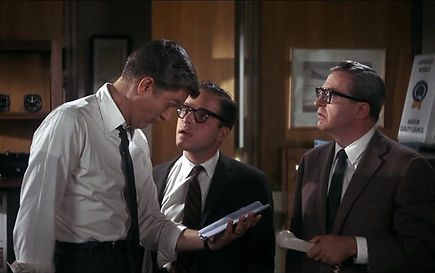
So Nelson was right...say goodbye to your money, Richard.

Barbara and Richard argue over finances while their lawyers casually plan a golf date. Sounds about right.
12. Get a head start on dating.
* For husbands, tread lightly if you find yourself falling for your friend's ex. Though your friend set it up in the first place, he may not be too happy with the situation, and let's face it, you won't be able to afford remarriage anyway with your alimony payments. Solution? Find someone for your ex-wife so you can be free financially, get remarried, and let your friend off the hook so he can remarry too. Any guy with adequate charm and an income will do - even the cute car salesman on TV, Al (Van Johnson), who promises to hand deliver any car purchased. Hmmm...jackpot!
* For wives, it's good to put yourself out there to get a taste of the single life. Don't be too off-put if a potential boyfriend's idea of a date is inviting you to his massive playdate with all his children/step/half kids and their respective fathers. It's weird, but...welcome to the divorce and remarriage world.

This can't end well.

Time for the dads to round up the kids - whether theirs or not!
13. Time to finalize this divorce!
* For both husbands and wives, you'll probably want to go out to celebrate the occasion with your current partner, but beware of ending up in the same spot. Awkward. Also, if you feel pangs of loneliness, try to fight them off. What could those be telling you anyway?

Barbara's face says it all. Al (Van Johnson) just looks confused.
14. Reveal and confront your true feelings.
* For both husbands and wives, if convenient, a hypnotist could assist with this should there be one nearby (in this world there is). At least one of you should be hypnotized - Barbara is in this case - and be forced to do things like dance around crazily, because everyone knows that helps reveal TRUE feelings - like the love you both still obviously have for each other. Let's be serious, there was never anything majorly wrong with your marriage in the first place to even warrant a divorce, so fall into each other's arms, go home...and find something to start arguing about.

Hypnotist Pat Collins has some strange methods.
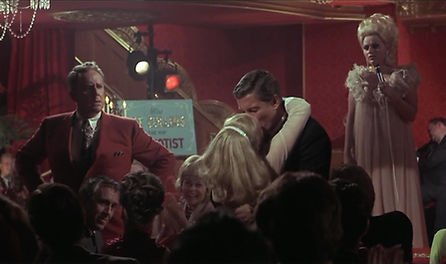
Sorry, Al.
15. Repeat if necessary. (Maybe not all the way through).
Divorce American Style is actually a marriage of star power and creative minds. It all began with a script by Norman Lear (Maude, All in the Family), which Dick Van Dyke recalled in his memoir as being a behemoth 300 pages. When the studio replied that the film couldn't possibly be that long, Lear apparently retorted: "It's my story, and by God I'm going to make it the way I see it" (154). That he did and with a first rate cast and crew to boot.
At the time, the two leads, Dick Van Dyke and Debbie Reynolds, were well-known for portraying wholesome, all-American characters, and in a way, their roles in Divorce American Style can be taken as a rather sardonic dig at those squeaky clean parts they found themselves generally typecast in, though the change didn't fare well with everyone: Dick Van Dyke remembered in his autobiography that his fans didn't take lightly to his portrayal of a man on the brink of divorce who visited a prostitute! However, compared to the rest of the cast, Van Dyke and Reynolds' characters leaned heavily on the naive side, sitting back, watching and learning from the circus that took place around them, namely in the forms of Jason Robards, Jean Simmons, Van Johnson and Joe Flynn, who all looked like they enjoyed working within this darkly satirical world.

Compared to the rest of the cast, these two are the relatively normal ones!
Murray Pomerance, in his essay in American Cinema of the 1960s: Themes and Variations, noted that many films from 1967 tended to "rebel stylistically and gain dramatic effect through innovative excesses of cinematographic, directorial, writing, or performance style" (174). Check, check, and check for writing, cinematography and performance in Divorce American Style. Lear's script amusingly hit many of the paradoxical divorce, alimony, and dating points on the head (Jason Robards trying to find his ex-wife a new husband to free himself of his financial obligation is particularly fantastic), and the decision to render Barbara and Richard completely oblivious to basically anything outside their comfortable 17 years of marriage hilariously catches both in the eye of the absurd divorce tornado they were swept into. Surrounded by exaggerated characters, such as Nelson, and bizarre situations, neither Richard nor Barbara realize what it all means until they see each other again when they're on the verge of officially separating. How convenient!
Cinematographer Conrad Hall elevated Lear's script and the actor's performances in some exceptionally photographed sequences, while director Bud Yorkin pulled it together at the helm to embellish Lear's take on the subject in distinctive ways. The intrusive, in-your-face opening dinner party greetings sequence in which everyone puts on a happy face (mimicked in 1989's Christmas Vacation), Barbara and Richard's perfectly choreographed and executed bedtime silent ballet/battle, the couple's freeze frame accusations at the bank, the chaotic circus of multi-family children and fathers on Barbara's date with Farley: "No Harriet, that's not Melissa. Melissa's your little sister, the one with the blanket!" and the dueling conversations between Barbara, Richard and their lawyers during their first meeting all effectively stress the utter absurdity of 1960s divorce culture through a scathing combination of clever dialogue, smart staging, and purposely overstated performances.

From this roundup...

...to this. In their defense, in this situation the chances of leaving one behind are quite high.
The rebellion and innovation flourishing in the film industry at the time was partly influenced by changing cultural values found in 1960s America. In particular, the women's liberation movement and the sexual revolution began to affect the way men and women viewed sex and marriage, and consequently, marriage and divorce statistics began to shift throughout the decade, the latter of which being what this movie poked fun at. According to an article entitled "Epidemiology of Divorce," marriage rates actually dropped in the early 1960s, while the number of divorces increased substantially during the last years of the decade, right around the time Divorce American Style came out. The movie smartly used this flux to take a stab at the divorce and remarriage process in a scathing manner, a technique past comedies with these elements, including The Divorcee (1930), The Women (1939), and even The Awful Truth (1937), had not broached up until that point, mostly because the divorce laws in America had stayed the same since the 1870s and heavily depended on one party's fault to grant a divorce.
However, there's a good 30 years or so in between those films and Divorce American Style, and by 1967, change was on the horizon: though revisions to the divorce law would not officially come until 1970 when California became the first state to recognize no-fault divorces and call for an equal division of community property (the Family Law Act), the outdated legislation had already been called into question and inspired much debate in the years leading up to 1970. Surely, the issues in question contributed somewhat to Lear's commentary, though in his autobiography, Van Dyke recalled that Lear's wife and other cast members' situations were likely sources for additional screenplay material too! (154-155).
The hot dispute surrounding the legalities and intricacies of the divorce law in the late 1960s, particularly pertaining to the idea of no-fault divorce and alimony, provides an interesting backdrop to view Divorce American Style in today. Despite Richard's 'visit' with Dede, no one was at fault in Richard and Barbara's separation - Barbara called it an "unraveling" - and certainly the chumminess displayed by exes (Nelson and Nancy) and at custody get-togethers (Farley and his cadre of divorced fathers) further supports evidence of mutual, no fault separations, though technically those were not available at the time (and there is no sufficient background given to anyone's split, not even Richard and Barbara's).
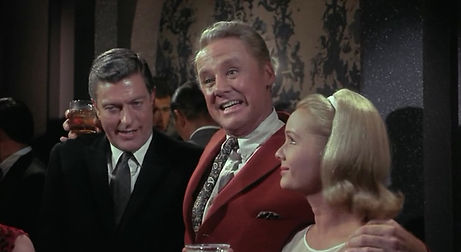
We're all friends here!
I'm not sure what Lear's stance on the topic of no-fault divorce was, but he took the opportunity to skew the subject by hilariously accentuating (and warning against?) the ease of falling into this type of divorce. It's obvious that Richard and Barbara don't really want to break up - they just need to talk to each other and listen! - and by showing how financially and romantically difficult it is to live within the divorce parameters, Lear re-endorses the idea of marriage in the end. He only does this for our main characters though, and he's sure to leave them with one final bit of snark: Richard and Barbara find out that life together may be the better choice for them and they reconcile, but as they enter their home and close the door, the bickering begins again. Thus, the action comes full circle, complete with the conductor climbing back atop his hill to orchestrate the next round of arguments. Marriage may be hard, but for Richard and Barbara it seems divorce was harder.

He's back!
Divorce American Style reaches its most absurd points when it sends up the touchy subject of alimony. The Family Law Act would stress an equal division of community property, which seemed to be sorely lacking in the years beforehand, at least in Divorce American Style, where Richard is forced to pay alimony AND maintain Barbara's standard of living, even if that means he can barely scrape by: "The uranium mine to her, and the shaft to me!" Richard cries out in the lawyer's office.

What Richard's new life will look like, sans money.
Lear's take on alimony is best embodied through Nelson, who walks with a limp because he can't afford foot surgery and reverts to teenager status through the ownership of a clunker car. Though these little details aptly convey the crushing weight of Nelson's financial obligations, perhaps the most scathing and by far hilarious plotline involving the subject begins when Nelson introduces Richard to Nancy in hopes of marrying her off so he won't have to pay alimony - after adequately scoping out Richard's level of income, naturally. However, the fact is that Nancy's comfortable as is, which means Nelson has to work extra hard to fix her up with a man who can meet the level of financial comfort she's used to. Of course, when Richard and Nancy start dating, the emotional effect on Nelson is not something he anticipated, but it's a hole he dug himself...in an attempt to get out of that other hole the separation/law put him in. Lear, Yorkin, and the actors excellently take the hilarity and sad desperation of this situation to dark extremes to point out how ludicrously antique some of the aspects of the day's divorce laws were.
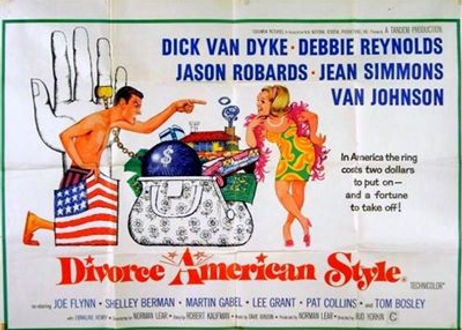
Wonder what Lear's take on divorce in 2014 would look like!
Though a bit dated, I found Divorce American Style an enjoyable ride, all the more when you take into account the historical ramifications of divorce in 1960s America.
Disclaimer: I was not alive in 1967. American cultural knowledge courtesy (hopefully accurate non-fiction) books and articles. If anyone reading has comments or memories of the divorce scene in the late 1960s, I would love to hear them!
How to observe Debbie Reynolds and Dick Van Dyke delightfully playing against type:
Divorce American Style is available on DVD and streaming from Amazon.com. If you have any friends on the verge of divorce, invite them over for a dinner party and casually put this movie on...
thanks for stopping by!
I See a Dark Theater is a website dedicated to classic movie-going—and loving—in the City of Angels. Whether it's coverage on screenings, special presentations, or Q&As around Los Angeles that you're looking for, or commentary on the wonderful and sometimes wacky world of classic cinema, you've come to the right place for a variety of pieces written with zeal, awe, and (occasionally) wit. Enjoy.

